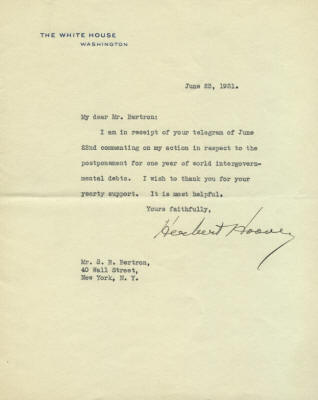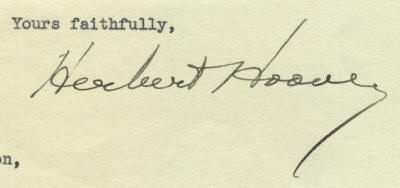808604
Herbert Hoover
Click on image for larger size
Herbert Clark Hoover, 1874–1964. 31st President of the United States, 1929–1933. Outstanding association Typed Letter Signed, Herbert Hoover, one page, 7" x 8¾", on stationery of The White House, Washington, [D.C.], June 23, 1931.
Hoover thanks Wall Street financier S. R. Bertron for his support of Hoover's plan to postpone repayment of international debt to the United States, conditioned on postponement of the payment of Germany's World War I war reparations, during the depths of the Great Depression. In full: “I am in receipt of your telegram of June 22nd commenting on my action in respect to the postponement for one year of world intergovernmental debts. I wish to thank you for your [h]earty support. It is most helpful."
This letter is a great piece of history with an excellent association. It references Hoover's attempt to save Germany from utter collapse—in his words, to maintain “courage and hope in the German nation,” thus helping Germany to preserve its “important relations to progress and stability in the world" and, in the end, fostering “political peace." Adolf Hitler's appointment as German Chancellor some 19 months later showed how late Hoover's actions were.
On June 20, 1931, three days before he wrote this letter, Hoover announced his plan to the press, and it was officially released the following day. The plan, he said, would “assist in the reestablishment of confidence, thus forwarding political peace and economic stability in the world."
With bipartisan support, Congress overwhelmingly approved Hoover's plan. In his statement on signing the moratorium bill on December 23, 1931, Hoover said:
In saving the collapse of Germany by the year’s postponement the American people have done something greater than the dollars and cents gained from the maintenance of our agricultural markets, the prevention of panic and unlimited losses. They have contributed to maintain courage and hope in the German nation, to give opportunity for the other European countries to work out their problems.
Ultimately, however, the moratorium did little to slow European economic decline, for it came too late. By the end of 1931, Germany had 5,000,000 unemployed and was in the throes of a major banking crisis.
The Nazi party of Adolf Hitler, which, among other things, rejected the war reparations and revived German nationalist sentiment, continually gained strength throughout this time. It came to power in Germany with Hitler's appointment as Chancellor on January 30, 1933, forever changing the course of 20th Century history.
Our search of auction records has found no other Hoover letter that mentions this plan to postpone the repayment of international debt. We have found only one other that refers to German war reparations, and that in the context of the causes for inflation.
This letter in very fine condition. It has one horizontal mailing fold and a virtually imperceptible paper clip impression at the top. Hoover has signed with an extraordinary black fountain pen signature.
Unframed.
_____________
This item has been sold, but
click here to see other
Presidents and First Ladies items
that we are offering.

